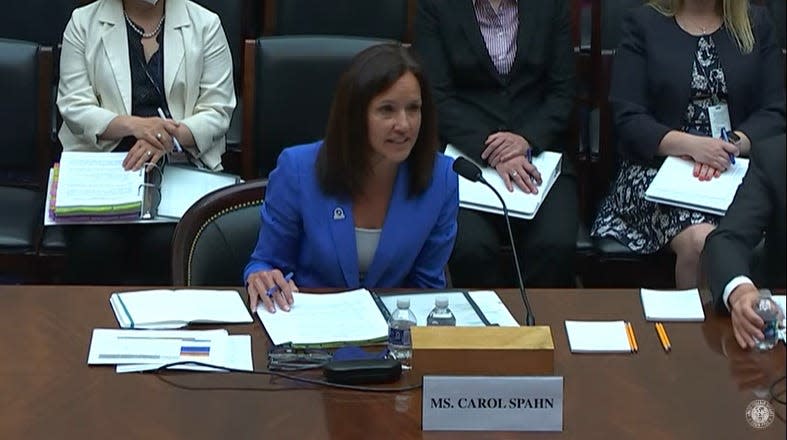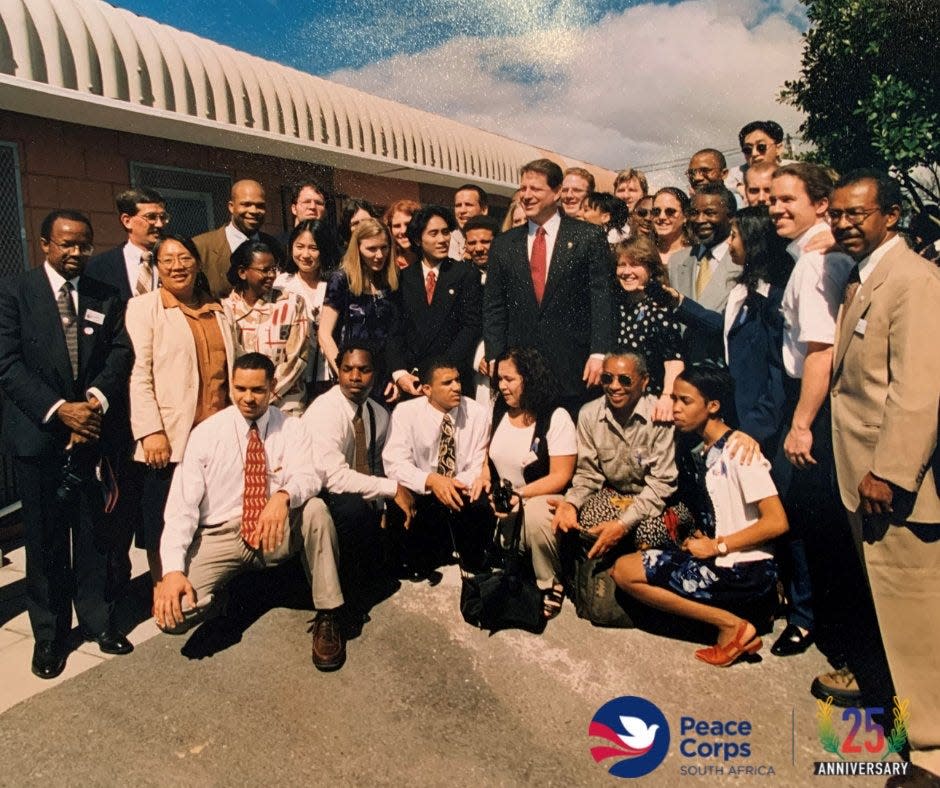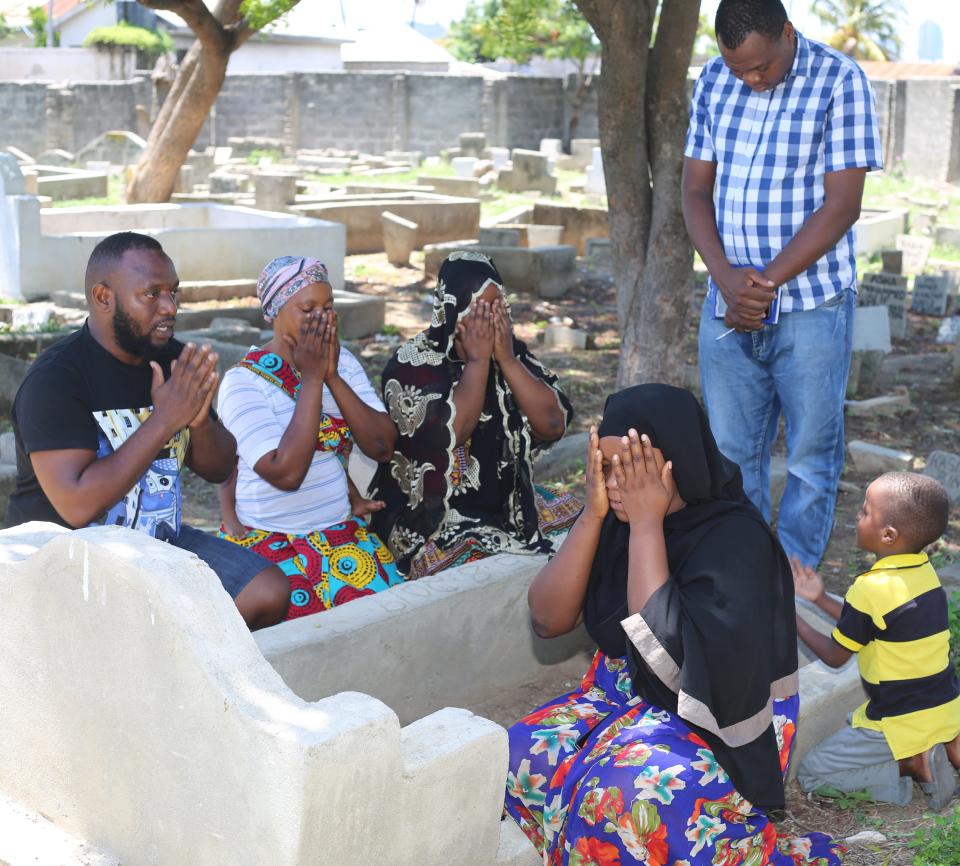Your tax dollars paid a Peace Corps worker $258,000 after he killed a woman
John Peterson sat in a Tanzanian police station in August 2019 after a chaotic driving spree that left a mother of three dead on the streets of Dar es Salaam. Before he could be criminally charged, Peterson’s employer – the U.S. government – whisked him back to America and put him on leave while he was under investigation.
Records obtained by USA TODAY show U.S. taxpayers paid Peterson, a Peace Corps employee, more than $258,000 over the next year and a half. That included nearly $20,000 in unused vacation time and a $1,500 “special act or service award” paid about a week after his return to America, records show. When he resigned in February 2021, after the Peace Corps revoked his security clearance, Peterson’s final paycheck had just $602 in deductions related to the fatal incident, including the cost to tow the Toyota RAV4 he wrecked.
The Peace Corps paid the family of the woman Peterson killed about $13,000, records show, despite a federal law that allows the agency to settle such claims for up to $20,000.
The Peace Corps paid more to the Tanzanian law firm it hired to negotiate the settlements with the deceased woman's family and two other women Peterson injured, according to an invoice from the firm. The records do not indicate that Peterson's victims had their own legal counsel during the settlement talks, which concluded about six months after the crash. In exchange for the payouts, the victims agreed to not make any legal claims against the agency or Peterson.
Video: Peace Corps women sexually assaulted while volunteering
The financial records, obtained by USA TODAY through Freedom of Information Act requests, illustrate the broad protections afforded to federal workers involved in even the most egregious behaviors. Far less consideration was given to those Peterson harmed, including a grieving and impoverished family, despite the agency’s aspirational mission of spreading “world peace and friendship.”
Agnieszka Fryszman, a lawyer who specializes in international human rights cases, reviewed the settlements for USA TODAY and raised concerns over the apparent lack of legal representation for Peterson’s victims. She said she was particularly troubled because the woman Peterson killed, Rabia Issa, had two underage children who did not appear to have guardians appointed to represent their interests, which almost certainly would have been the case if the incident had occurred in the USA.
“They give up all their rights for this relatively low award,” Fryszman said. “And there's some value to speed and quick recovery. But if people don't really understand what their rights are and what they might be entitled to in order to protect their interests – and protect the interests of kids who are very young and might need support for a pretty long time – it just doesn't seem fair.”
Peace Corps CEO Carol Spahn, who was nominated to lead the agency as a Senate-confirmed director, has repeatedly declined interview requests about Peterson. At an employee town hall in January, she said agency officials were restricted in handling the case by “laws and required processes” and stressed that federal law did not allow foreign service workers to be suspended without pay while under investigation. A spokeswoman declined to explain why Peterson's actions required such a lengthy investigation.

“Federal law and Peace Corps internal policies provide due process protections to employees under investigation for misconduct,” Peace Corps spokeswoman Karla Alvarado-Chavez said in a statement. “With regard to the incident about which you have inquired, Peace Corps fully complied with those laws and policies.”
Spahn, who did not lead the Peace Corps at the time of the Peterson incident, said in January that the agency was exploring changes “to address some of the limitations that Peace Corps faced in this matter.”
Mary Kuntz, a lawyer who specializes in federal employment cases, told USA TODAY that federal law would have prohibited the Peace Corps from immediately firing Peterson and offered him other protections while under investigation. If the agency had moved hastily, she said, Peterson could have appealed his termination to a federal grievance board and received not only back pay but damages.
Still, Kuntz said, 18 months of paid leave is excessive.
“Why in the world did it take 18 months to investigate a flagrant, awful situation that should have taken two weeks [to investigate]?” she said. “That’s my question.”
Officials from the State Department, which helped arrange for Peterson to be medically evacuated after the crash and jointly investigated the case with the Peace Corps’ internal watchdog, have repeatedly declined to answer questions about the incident.
Peterson, 67, declined to comment through his attorney, Mark Zaid, who said in a statement that the government handled the "unfortunate incident" and that Peterson had no involvement in the settlement decisions.
New details on reckless spree
The records obtained by USA TODAY include details about Peterson’s employment history with the agency in Africa, along with previously unreported elements of his fatal hit and run in 2019, which the agency said unfolded after Peterson was drinking at a bar and brought a sex worker back to his government-leased home.
Peterson signed up for the Peace Corps in 1977 at age 22 and volunteered in Senegal. After two years of service, he worked at a Peace Corps training center in Senegal that was operated by an outside contractor and was hired as training director, according to a letter of reference in his employment file. In the early 1990s, he joined the Peace Corps' staff, working in Togo, then helping to open the first program in South Africa, a historic moment for the Peace Corps after the end of apartheid.

Peterson returned to the Peace Corps in 2017 as the director of management and operations in Tanzania. Two of his former Peace Corps supervisors offered positive recommendations, telling the agency in reference checks that they would rehire him.
In June 2019, Peterson received a $4,000 raise to his roughly $135,000 salary after his work was deemed to be “at an acceptable level of competence,” records show.
Three months later, Peterson was drinking at a bar in Dar es Salaam and picked up a sex worker in his diplomatic-plated vehicle, according to agency records and interviews with people familiar with the events. He brought the woman to his home and paid her for sex, the agency said.
Around dawn, while driving the sex worker back to the area where he had picked her up, he struck and injured a Tanzanian woman in her early 20s. An angry crowd gathered. According to a memo summarizing the incident sent to the agency’s then-director, Jody Olsen, Peterson told the bystanders he would drive to a nearby police station. Instead, he drove in the other direction, and a group of motorcyclists pursued close behind. (Peterson’s lawyer said the crowd attacked Peterson, causing serious injuries. Peace Corps records say only that the group threw rocks at his vehicle.)
As he fled the scene of the first crash, Peterson hit and killed Issa, 47, as she set up the roadside stand where she sold fried cassava and other street foods to support her family. Peterson kept driving, and the sex worker he had hired leaped from his moving vehicle. Peterson crashed into a large signpost and was taken into custody by police.
.oembed-frame {width:100%;height:100%;margin:0;border:0;}
Peterson refused to take a breathalyzer at the police station but was released from custody, so he could receive medical attention, according to the Peace Corps Office of Inspector General. Officials from the State Department and the Peace Corps declined to say whether any employees from either agency helped secure his release.
Within hours of the early morning crash, Peterson emailed a photo of a page of his passport to the Peace Corps Tanzania country director. He left the country that evening on a plane that routed him through Ethiopia and Ireland on his way back to Washington’s Dulles airport.
Taxpayers covered the costs associated with the medical evacuation, including $4,800 for two airline tickets for Peterson and an escort and $400 in travel stipends. About a week after returning to the USA, the Peace Corps paid Peterson $1,500 for what records described as an “individual special act or service award” that had been approved by the agency two weeks before the incident.
On leave with no work assigned to him, Peterson’s salary increased by about $18,000 over the following year and a half because of routine raises given to federal employees and because the agency reassigned him from Dar es Salaam to Washington, records show. (The agency said salary is based on the assigned work location.) The inspector general investigated Peterson's actions and referred the case to the Department of Justice, which declined to prosecute Peterson, citing a lack of jurisdiction. The Peace Corps revoked Peterson’s security clearance.
When he resigned soon after in February 2021, Peterson – who was never criminally charged in Tanzania or the USA – was making $156,950 annually.
His final paycheck included $19,852 in unused leave time.
A ‘black eye’ for the agency
Within days of the crash, while Peterson was safely back in the USA, the Peace Corps in Tanzania engaged a local lawyer who prepared “talking points” for a discussion with the police, according to an invoice from the law firm. Over the next six months, Asyla Attorneys billed the Peace Corps a total of $14,514, including tax, at a rate of typically $200 to $300 an hour.
Documents outlining the firm’s work were partially redacted by the Peace Corps before being provided to USA TODAY. They describe the lawyer meeting with the victims or their relatives and having discussions with police. In two dozen pages of records related to the settlements, there is no mention of any of Peterson’s victims having their own lawyers. A Peace Corps spokeswoman did not answer when asked if all the parties had representation.


The Peace Corps signed three settlements, records show. Federal law allows the agency to pay up to $20,000 to settle injury or property damage claims involving its employees and volunteers — a figure that hasn't increased since 1978.
None of Peterson’s victims received the full amount. The agency paid the equivalent of about $6,500 to the first woman Peterson hit and injured. About $2,200 went to the sex worker who was in the car as Peterson fled the first crash. Both women incurred “medical expenses, loss of income and pain and suffering," according to the records.
Issa’s family received 30 million Tanzanian shillings, the equivalent of roughly $13,000. The settlement noted that Issa’s three children “are now left without their main caretaker and without the love and affection of their natural mother.”
“We agree and acknowledge that neither the U.S. Government nor the Peace Corps are liable in anyway and that the payment is made as a gesture of goodwill and condolences and that upon my receipt of the payment, the U.S. Government and the Peace Corps, and its employee John M. Peterson, owe us and our family nothing more,” the settlement with Issa's family reads. The other settlements include similar language.

The partners at Asyla Attorneys did not respond to a request for comment.
The money – which the Issa family received in the form of a roughly $130 cash advance and a lump sum covering the remaining balance – did not go far, Issa’s oldest son, Benja, told USA TODAY. He said some was taken by middlemen who offered assistance to the family after his mother’s death, and the rest was divided among other expenses including repairs to a family home and payments on a loan the mother had taken out for one son’s schooling.
At an employee town hall in January, CEO Spahn defended how the Peace Corps supported Issa’s relatives. She said the agency contacted the family after a typical mourning period in Tanzania and the relatives had initially requested a third of the amount that was provided.
Jonathan Kaufman, executive director of the nonprofit Advocates for Community Alternatives and a lawyer who has represented individuals and communities in Africa who have suffered human rights and environmental injuries at the hands of powerful institutions, said settlement negotiations of this kind must be handled with care. Speaking in general and not about Peterson’s case, he said he focuses not just on how much his client needs to be made whole but how a settlement can be structured for long-term sustainability.
For example, he said, lump sum payments can “do more harm than good” in some cultures where it is expected that resources be shared among a family rather than used only by those directly harmed. He said settlements can instead be paid in installments, include a trust or be given in the form of a scholarship. When minors are involved, he said, his instinct is to avoid a “lump sum payment with no controls over how it is used.”
“This is really delicate,” he said. “Because you don't want to be paternalistic. You don't want to be condescending to a family in a community that know exactly what they're doing. And you also want to respect the culture of the people that you're working with.
“But,” he added, “there are ways to work out and make sure that money that's being provided goes to the purpose that it was meant for.”
.oembed-frame {width:100%;height:100%;margin:0;border:0;}
Fryszman called the incident a “black eye” for the Peace Corps and encouraged officials to “make this right” by ensuring a similar case would be handled differently in the future.
“They have some obligation to have a systemic better process for the next kids or the next people that this happens to,” Fryzman said. “As much as you hope that this would never happen again, things happen and accidents happen and people use bad judgment. And you would want them just to have a better process and something more fair.”
Tricia L. Nadolny and Nick Penzenstadler are reporters for USA TODAY. Tricia can be reached at tnadolny@usatoday.com or on Twitter at @TriciaNadolny. Nick can be reached at npenz@usatoday.com or @npenzenstadler, or on Signal at 720-507-5273.
.oembed-frame {width:100%;height:100%;margin:0;border:0;}
#content-9714942002 .pull-quote-share-button .button-content, .pull-quote-share-button .facebook-button-content, .pull-quote-share-button .linkedin-button-content, .pull-quote-share-button .reddit-button-content, .pull-quote-share-button .twitter-button-content{background-color:#eeeeee;}#content-9714942002 .pull-quote-share-button .button-text{color:black;}#content-9714942002 .pull-quote-share-button svg {}#content-9714942002 .component—pullquote__buttons a {text-decoration:none;}#content-6452833001 .pull-quote-share-button .button-content, .pull-quote-share-button .facebook-button-content, .pull-quote-share-button .linkedin-button-content, .pull-quote-share-button .reddit-button-content, .pull-quote-share-button .twitter-button-content{background-color:#eeeeee;}#content-6452833001 .pull-quote-share-button .button-text{color:black;}#content-6452833001 .pull-quote-share-button svg {}#content-6452833001 .component—pullquote__buttons a {text-decoration:none;}#content-7382166001 .pull-quote-share-button .button-content, .pull-quote-share-button .facebook-button-content, .pull-quote-share-button .linkedin-button-content, .pull-quote-share-button .reddit-button-content, .pull-quote-share-button .twitter-button-content{background-color:#eeeeee;}#content-7382166001 .pull-quote-share-button .button-text{color:black;}#content-7382166001 .pull-quote-share-button svg {}#content-7382166001 .component—pullquote__buttons a {text-decoration:none;}#content-7570972001 .pull-quote-share-button .button-content, .pull-quote-share-button .facebook-button-content, .pull-quote-share-button .linkedin-button-content, .pull-quote-share-button .reddit-button-content, .pull-quote-share-button .twitter-button-content{background-color:#eeeeee;}#content-7570972001 .pull-quote-share-button .button-text{color:black;}#content-7570972001 .pull-quote-share-button svg {}#content-7570972001 .component—pullquote__buttons a {text-decoration:none;}
This article originally appeared on USA TODAY: Taxpayers funded Peace Corps worker’s paid leave after he killed woman


